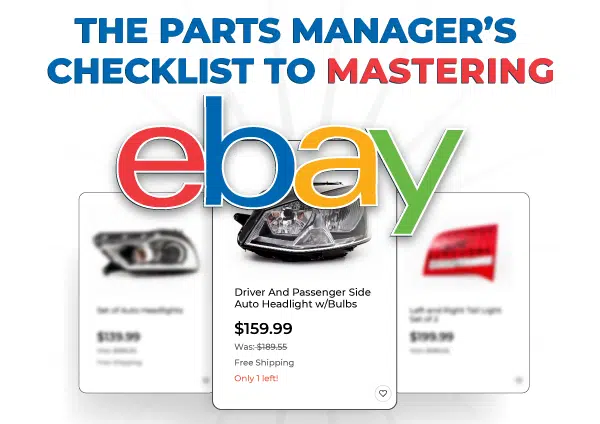Over the past few years, the online Direct-to-Consumer (D2C) model has been growing in popularity across various industries, including automotive parts. This strategy allows specialty automotive parts manufacturers to bypass traditional retail channels and directly sell their parts and accessories to buyers, with the ability to incorporate your distribution network as fulfilling nodes. This model also helps manufacturers maintain more control over their brand and the customer experience while increasing profit margins.
Understanding the D2C mode and its benefits is essential for manufacturers looking to implement a strategy that will allow them to remain competitive, scale their business, and own consumer data to market and build a strong relationship.
Understanding the D2C Model for Parts
In the traditional retail model, a product’s journey from manufacturer to consumer involves several intermediaries, including wholesalers, distributors, and secondary retailers. Each of these layers adds time and cost to the product’s journey and puts distance between the manufacturer and the end consumer.
Enter the online D2C model—a shift that streamlines this journey, connecting specialty automotive parts manufacturers directly with consumers.
Simply put, D2C refers to a business strategy where manufacturers sell their products directly to consumers, bypassing traditional retail intermediaries. In the digital age, this is often achieved through eCommerce platforms, where manufacturers can set up their online stores and sell products straight from their warehouses to the customers’ doorsteps. In addition, they can also utilize their existing distribution network to fulfill demand.
There are several key differences between traditional retail and digital D2C models:
Customer Relationship
In traditional retail, the retailer often owns the relationship with the end consumer. In contrast, in a digital D2C model, the manufacturer is able to engage directly with the customer, allowing them to build a stronger relationship with customers, gather direct feedback, and understand their needs better.
Control Over Brand and Product Information
With D2C, manufacturers control how their brand and products are presented, enabling consistent messaging and an enhanced brand experience. This level of control is often missing in traditional retail, where the retailer might influence pricing, product placement, and brand messaging.
Pricing and Profit Margins
The D2C model allows manufacturers to control their own destiny by setting their own prices, implementing MAP pricing, or allowing their distribution network to set prices. This cuts out the middleman and leads to potentially higher profit margins.
Data Ownership
With D2C, manufacturers gain direct access to consumer data, from basic contact information to shopping preferences and behaviors. This valuable data can be leveraged for personalized marketing and to inform future business decisions.
Distribution Network
Manufacturers can grow their D2C together with their distribution network by enabling them to fulfill demand. This model removes channel conflict and enables the long-standing relationship with WDs as they digitally grow together.
By understanding these differences, parts manufacturers can better appreciate the value of a strong digital D2C model, setting the stage for business growth and increased customer satisfaction.
The Benefits of D2C for Parts Manufacturers
The D2C model brings with it a wealth of advantages for specialty automotive parts manufacturers. By embracing this shift, businesses stand to gain across several key areas:
Accessibility to All Inventory
Unlike traditional retail models, which may limit the variety of parts a manufacturer can offer, D2C allows manufacturers to showcase and sell their entire catalog of products and market all inventory present among their distributors. This in turn creates a strong SLA that decreases shipping times and provides the best customer experience.
Brand Control and Direct Customer Engagement
Selling directly to consumers means manufacturers have complete control over how their brand is presented and perceived. They can ensure consistency in brand messaging, design elements, and customer experience throughout the buying experience. This helps build stronger relationships that enhance customer loyalty and drive repeat business.
Ownership of Consumer Data
D2C sales provide manufacturers with valuable access to consumer data that is often otherwise lost. This information can be leveraged to refine marketing strategies, personalize customer communication, and develop products that more accurately meet consumers’ needs and preferences.
Positive Impact on EBITA Through Reduced Multi-Step Distribution
By cutting out intermediaries and moving from a multi-step distribution to a D2C model with the ability to fulfill demand directly or through an existing distribution network, manufacturers can substantially their Earnings Before Interest, Taxes, and Amortization (EBITA). This cost-saving approach translates into more competitive pricing for consumers and higher profit margins for manufacturers.
These benefits make a compelling case for parts manufacturers to adopt a robust digital D2C model. By doing so, they can tap into new levels of growth, customer satisfaction, and profitability.
Implementing a D2C Model
Transitioning to a D2C model involves a strategic shift in operations, marketing, and sales. One of the most crucial components of this transition is the need for a robust eCommerce platform.
An effective eCommerce platform is the backbone of your D2C strategy. It’s where consumers interact with your brand, explore your products, and make purchases. Therefore, it needs to be intuitive, responsive, secure, and capable of providing a seamless customer journey.
This is where RevolutionParts can help. Our eCommerce solution is specifically designed to help parts manufacturers establish a strong and successful digital D2C business model.
Key Features of the RevolutionParts Platform
Intuitive Design and User Experience
RevolutionParts provides an easy-to-use platform for you and your consumers. A clean interface and intuitive navigation make it easy for customers to find what they need, enhancing the overall user experience and increasing conversions.
Ingestion of ACES & PIES Catalogs
RevolutionParts makes it simple to integrate most parts catalogs directly into the platform and manage thousands of products. These products are mapped to vehicle YMM and VIN so shoppers can find the right part for their vehicle.
Advanced Data Analytics
With RevolutionParts, you gain access to comprehensive data analytics tools. These tools allow you to track key metrics, understand consumer behavior, and glean insights that inform your business decisions and marketing strategies.
Secure and Reliable Platform
Security is a top priority for RevolutionParts. Our platform uses advanced security measures to protect you and your customer’s data. Plus, our reliable infrastructure ensures your online store is always available and running smoothly.
Parts Marketing Agency
RevolutionParts provides access to an in-house marketing agency that specializes in digital parts marketing. By leveraging consumer data, our agency is able to create targeted campaigns that resonate with your audience, drive engagement and increase sales growth.
Leverage Existing Distribution Network
RevolutionParts makes it possible to use existing distribution networks in conjunction with a D2C model to provide faster fulfillment, reduce operational costs, and seamlessly scale your business.
By choosing RevolutionParts, parts manufacturers can streamline the transition to a D2C model, capitalizing on the numerous benefits it offers. From improved customer relationships to increased profitability, a well-implemented D2C strategy positions manufacturers for long-term success in the digital age.
Conclusion
Implementing a digital D2C strategy helps specialty automotive parts manufacturers gain more brand control, better customer engagement, complete ownership of consumer data, and improved EBITA. Manufacturers can gain tools that help to streamline operations by leveraging existing distribution networks and ensuring seamless scaling as the business grows.
RevolutionParts offers an eCommerce solution that meets today’s D2C expectations and continually adapts to stay ahead of emerging trends and technologies. By embracing the D2C model and its array of opportunities, manufacturers can reshape their business, deliver exceptional customer experiences, and drive significant growth.
To learn more about how RevolutionParts can enable your D2C journey and propel your business to new heights, click the button below to contact us for an in-depth look.





